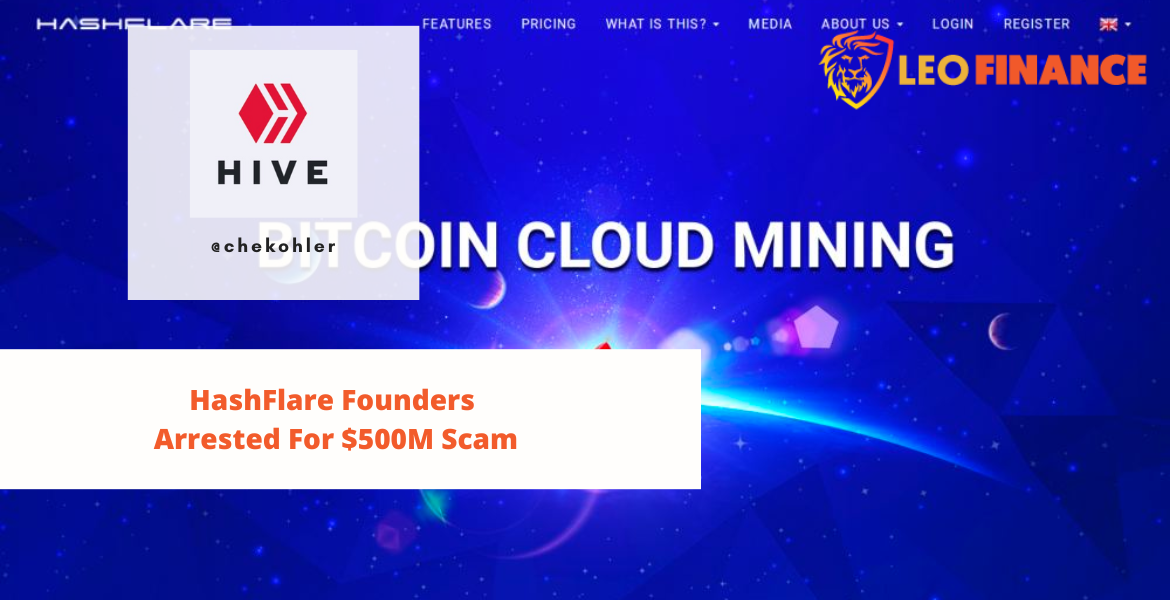HashFlare Founders Arrested For $500M Scam
In today's edition of YIYL (You Invest, You Lose) we head back into time, nearly 7 years now and this shows that the long arm of the law moves slow. A lot of scammers in shitcoins thought they got away with their crimes, but that's the thing about crime, it does pay, but in the short term.
Yes, everyday people get away with crime, but you have to remember that the next day isn't given and you can get caught, especially if you're sloppy at covering your trails and you will have to always be on your guard.
Recently two Estonians have been arrested and are facing extradition to the US after being accused of defrauding thousands of people out of around $575 million with a crypto Ponzi scheme, according to the US Department of Justice.
Sergei Potapenko and Ivan Turõgin, along with four unnamed co-conspirators, were allegedly behind a scam crypto mining company called HashFlare and a fake crypto bank project called Polybius.
This is nothing new for the shitcoin space especially in the early days, fake Eastern European companies, especially ICOs were booming and all too happy to take money off "stupid Americans" willing to YOLO their cash into any half-baked website that offered a return.

A Scam from humble beginnings
The business or rather scheme began in 2013 when Potapenko, Turõgin, and the others started a company called HashCoins. The company played on the trend that mining was becoming more formalised and you now needed decent equipment to mine bitcoin or shitcoins, when shitcoins still felt that mining is part of their ecosystem.
HashCoins said it built cryptocurrency mining equipment, though the DOJ says it actually only “sometimes” resold equipment and components that it bought off the shelf, which is what shitcoiners do, they don't want to do work, they just want to find a way to rentseek.
By 2015, though, the indictment says that HashCoins had customers who were unhappy that they hadn’t received the mining equipment they’d purchased.
Remove the mining altogether with Hashflare
Given that you were selling people dog shit miners at a mark up, meant you were always going to burn your leads and as your reputation dies, so does your ability to move product. So instead of taking the path of improving the quality of the miners they sold, the company pivoted to HashFlare, a cloud mining company.
Instead of having to ship physical miners, you now just tell customers they can get a return on a pool of miners if only they invest. Now you're moving from an eCommerce business to an investment contract but in those days no one was really thinking that far they were just thinking profit.
The idea was a hit, you could now sell people promises they can't verify and HashFlare made bank, collecting $550 million in fiat, bitcoin, and some shitcoins.
Now to be fair to Hashflare they did mine some bitcoin and shitcoins, but realised it's actually fucking hard so just started to pretend that they are mining more than they actually would get.
Like many failed cloud miners, Hashflare had a fake ass dashboard that showed you profits and that kept some customers from pulling a bank run, those that wanted their money back were often hit with excuses as Hashflare simply didn't have the liquidity and had to ponzi up payments with new customer funds.
2017, time to ICO
Eventually, the balance sheet wasn't looking so good and in 2017 the chance came around to raise some no strings attached capital via an ICO.
Back then all you needed was a single-page website, a white paper you copypasta'd from someone else, and a story and you could raise funds. In this instance, Hashflare was planning to sell tokens to raise funds so it could start something called “Project Polybius,” a “fully digital bank” that used the blockchain.
According to reports, they were able to raise a further $25 million in the ICO and transfer it to themselves, and then exit the scam.
5 Years later
The FBI finally got on the trail of this half-a-billion-dollar scam and started investigating the alleged fraudulent schemes of HashFlare, HashCoins OU, and Polybius. This lead to the arrest of Potapenko and Turõgin who are facing charges of conspiracy to commit wire fraud, conspiracy to commit money laundering, and 16 counts of wire fraud.
The FBI has stated that they are currently not making any promises about them getting that money back, and im pretty sure by now most of it has been spent. Sure there could be claw backs on their assets and whatever bank accounts can be tied to the two arrested, but don't hold your breathe.
Scammers aren't exactly good at managing money and they'll buy dumb shit that can't be liquidated for much capital, so I wouldn't be surprised if any of the victims get anything back.
Sources:
Have your say
What do you good people of HIVE think?
So have at it my Jessies! If you don't have something to comment, "I am a Jessie."
Let's connect
If you liked this post, sprinkle it with an upvote or esteem and if you don't already, consider following me @chekohler and subscribe to my fanbase
| Earn Free bitcoin & shop | Earn Free Bitcoin & shop | Claim Free Bitcoin & Shop |
|---|---|---|
 |  |  |
Posted Using LeoFinance Beta
Gez I had totally forgotten about this one but remember how hard it was pushed. I think a big thing of it was passive income for people and back then there was no staking options. I feel that's why staked APR crypto tokens are hot at the moment. It's what people want.
Posted Using LeoFinance Beta
Yes, the idea that savings aren't going to get you far and you need to seek out returns further out the risk curve will always push people who have no idea how to manage risk into things like cloud mining, staking and yield products and most of them will be worse off than if they simply let the bank give them a shit interest rate, because 1% return - inflation is still better than losing all your money